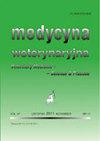快速检测FCoV Ab (Vet Expert)和PCR在猫感染性腹膜炎(FIP)诊断中的敏感性比较
IF 0.4
4区 农林科学
Q4 VETERINARY SCIENCES
Medycyna Weterynaryjna-Veterinary Medicine-Science and Practice
Pub Date : 2023-01-01
DOI:10.21521/mw.6745
引用次数: 2
摘要
本研究的目的是确定FCoV Ab快速血清学检测在诊断猫渗出型FIP中的有效性。参与研究的猫被分为两组。研究组由40只猫组成,这些猫的腹部液体中有一种FCoV菌株引起FIP(存在M1058L突变),采用PCR检测。对照组为15只非FCoV感染引起的腹水猫。血清学检查显示,从研究组的动物身上收集的40份液体样本中有28份存在猫冠状病毒抗体,占测试样本的70.0%。使用快速免疫层析测试从对照组的猫身上收集的任何腹膜液样本中均未发现冠状病毒抗体。在我们自己的研究中获得的结果表明,血清学测试确保了非常高的概率,特别是在检测受感染的动物,以及在排除腹膜腔液体样本中存在FIP病毒感染的可能性,尽管概率略低。本文章由计算机程序翻译,如有差异,请以英文原文为准。
Comparison of the sensitivity of rapid tests, FCoV Ab (Vet Expert) and PCR, in the diagnosis of feline infectious peritonitis (FIP) in cats with the effusive form of the disease
The aim of the study was to determine the usefulness of FCoV Ab rapid serological tests in the diagnosis of the effusive form of FIP in cats. The cats included in the study were divided into two groups. The study group consisted of 40 cats with a strain of FCoV causing FIP (the presence of the M1058L mutation) in the abdominal fluid determined using PCR. The control group consisted of 15 cats with ascites caused by factors other than FCoV infection. Serological examination demonstrated the presence of antibodies to feline coronavirus in 28 out of 40 samples of the fluid collected from animals included in the study group, which constituted 70.0% of the tested samples. No antibodies to coronavirus were identified in any of the peritoneal fluid samples collected from the cats included in the control group using rapid immunochromatographic tests. The results obtained in our own studies demonstrated that the serological test ensured very high probability, especially in the detection of infected animals, as well as, although with a slightly lower probability, in the exclusion of the presence of FIP virus infection in the samples of fluid collected from the peritoneal cavity.
求助全文
通过发布文献求助,成功后即可免费获取论文全文。
去求助
来源期刊

Medycyna Weterynaryjna-Veterinary Medicine-Science and Practice
VETERINARY SCIENCES-
CiteScore
0.80
自引率
0.00%
发文量
73
审稿时长
4-8 weeks
期刊介绍:
"Medycyna Weterynaryjna" publishes various types of articles which are grouped in the following editorial categories: reviews, original studies, scientific and professional problems, the history of veterinary medicine, posthumous memoirs, as well as chronicles that briefly relate scientific advances and developments in the veterinary profession and medicine. The most important are the first two categories, which are published with short summaries in English. Moreover, from 2001 the editors of "Medycyna Weterynaryjna", bearing in mind market demands, has also started publishing entire works in English. Since 2008 the periodical has appeared in an electronic version. The following are available in this version: summaries of studies published from 1999 to 2005, full versions of all the studies published in the years 2006-2011 (in pdf files), and full versions of the English studies published in the current year (pdf). Only summaries of the remaining studies from the current year are available. In accordance with the principles accepted by the editors, the full versions of these texts will not be made available until next year.
All articles are evaluated twice by leading Polish scientists and professionals before they are considered for publication. For years now "Medycyna Weterynaryjna" has maintained a high standard thanks to this system. The review articles are actually succinct monographs dealing with specific scientific and professional problems that are based on the most recent findings. Original works have a particular value, since they present research carried out in Polish and international scientific centers.
 求助内容:
求助内容: 应助结果提醒方式:
应助结果提醒方式:


